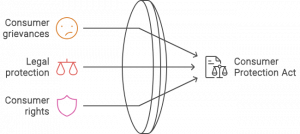From UPSC perspective, the following things are important :
Prelims level: Judiciary; Consumer Protection Act (CPA)
Mains level: Judiciary; Judicial overreach; Consumer Protection Act (CPA)
Why in the news?
Recently, the apex court held that lawyers as ‘professionals’ could not be subjected to legal proceedings for providing faulty ‘service’ under the Consumer Protection Act 2019 (CPA). A similar case applies to Medical practitioners which is in high controversy.
What is the Consumer Protection Act (CPA)?
| Consumer Protection Act, 1986 | Consumer Protection Act, 2019 | |
|---|---|---|
| Purpose | Enacted to provide simpler and quicker access to redressal of consumer grievances. | Repeals and replaces the CPA, 1986. |
| Introduction of Concept | Introduced the concept of ‘consumer’ and conferred additional rights on consumers. | Expands the scope of the definition of ‘consumer’ to include transactions conducted offline or online through electronic means, teleshopping, direct selling, or multi-level marketing. |
| Scope of Protection | Protects individuals fitting the definition of ‘consumer’ as defined by the Act. | Extends protection to a wider range of transactions, including those related to banking, insurance, transport, housing construction, entertainment, amusement, etc. |
About the previous case – Indian Medical Association vs V P Shantha (1995):
- In 1995, a three-judge bench of the SC ruled, “Doctors would be covered under the consumer protection law, allowing the filing of several medical negligence lawsuits against doctors for deficiency in service”.
- The court also acknowledged that medical professional occupations are often “skilled” work which differs from other occupations and the success usually depends on factors that are beyond the doctor’s control.
Diversity of present Opinions:
- What did the National Consumer Disputes Redressal (NCDR) Commission say?
-
-
- In 2007, the NCDR Commission held that lawyers provide a service to their clients and hence they can be sued for deficiency of service.
- This case ultimately reached the apex court where the judgement was passed recently.
-
- What did the Apex court say?
-
- The court said that the objective principle of the CPA 2019 was to protect consumers from unfair trade practices and unethical business practices (the law was not intended to include professionals).
- The court noted that the legal profession is unique and cannot be compared with any other profession.
- According to the SC, hiring or availing of an advocate is “a contract of personal service” and is therefore exempted from the scope of the consumer protection law.
About the Consumer Redressal Commissions in India:
|
Why does the Apex Court not Exempt Medical Profession from the Purview of CPA?
- Firstly, doctors have specific duties to their patients, such as deciding on treatment and its administration.
- Secondly, if a doctor breaches these duties by failing to provide a reasonable standard of care, they can be held liable under the CPA.
- Additionally, the court believes requiring commission members to have case-specific knowledge would be impractical and burdensome.
Conclusion: This decision aims to prevent potential imbalances between District and State Commissions in handling cases and places the responsibility on parties to provide evidence for informed decisions.
Get an IAS/IPS ranker as your 1: 1 personal mentor for UPSC 2024

